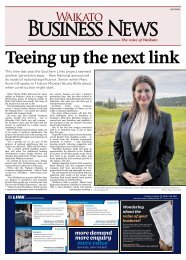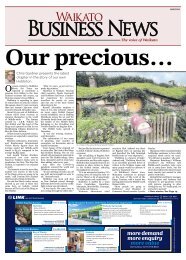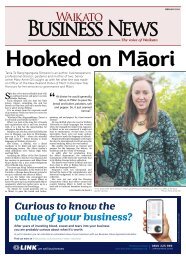Waikato Business News August/September 2020
Waikato Business News has for a quarter of a century been the voice of the region’s business community, a business community with a very real commitment to innovation and an ethos of co-operation.
Waikato Business News has for a quarter of a century been the voice of the region’s business community, a business community with a very real commitment to innovation and an ethos of co-operation.
Create successful ePaper yourself
Turn your PDF publications into a flip-book with our unique Google optimized e-Paper software.
WAIKATO BUSINESS NEWS <strong>August</strong>/<strong>September</strong> <strong>2020</strong><br />
7<br />
Just do it. Or not?<br />
Every branding project is fraught with the eternal dilemma of<br />
whether or not to include a tagline. Is it necessary? Does it add<br />
value? Does it reflect who we are?<br />
TELLING YOUR STORY<br />
> BY VICKI JONES<br />
Vicki Jones is director of Dugmore Jones, Hamilton-based brand<br />
management consultancy. Email vicki@dugmorejones.co.nz<br />
My view has long<br />
been that a tagline<br />
is only necessary if<br />
it is memorable for the right<br />
reasons, if it makes your customers<br />
feel good about your<br />
brand.<br />
And I’m not talking about<br />
advertising slogans here,<br />
which may be integral to a<br />
brand for a long period but<br />
are campaign related and can<br />
evolve over time. I’m meaning<br />
the line that sits with your<br />
logo for a considerable time,<br />
or even forever.<br />
Sometimes a tagline may<br />
be needed to help explain<br />
or reinforce something you<br />
really want people to understand.<br />
After all, the words<br />
and logo of your branding<br />
can only do so much – and<br />
we shouldn’t have monumental<br />
expectations of what can<br />
be articulated in that small<br />
space, even if you include a<br />
visual element that helps tell<br />
the story. My feeling is that<br />
the best taglines are those that<br />
give you a sense of the brand’s<br />
character, or that show that it<br />
understands what I need from<br />
my relationship with them.<br />
Sitting at the lights at the<br />
junction of Mill and Victoria<br />
Streets, I’ve admired the signage<br />
for Safewise for years. It<br />
bears the tagline ‘where safety<br />
is no accident’. I’m afraid I<br />
know little about Safewise but<br />
it tells me enough to assume<br />
they do something about<br />
workplace safety, and the tagline<br />
assures me that they are<br />
thorough and to be trusted.<br />
Even if you don’t know<br />
what it means in English,<br />
you probably know who<br />
‘Vorsprung durch Technik’<br />
belongs to. Even if you don’t<br />
love it, you’re undoubtedly<br />
familiar with ‘I’m lovin’ it’.<br />
And ‘Just do it’ has become so<br />
recognisable that they don’t<br />
even use the brand name a lot<br />
of the time. But those brands<br />
now have the advantage of<br />
visibility and scale that deep<br />
marketing pockets bring.<br />
Those of us with more modest<br />
budgets have to work smarter.<br />
There are a few tricks and<br />
tips that you can consider.<br />
Alliteration is often effective,<br />
as the sounds help make it<br />
memorable. Keeping it short<br />
is key – the three word rule<br />
often wins here.<br />
Leveraging a sentiment that<br />
you know is important to your<br />
audience is another approach.<br />
Speights beer championed<br />
‘Pride of the South’, appealing<br />
to regional allegiance that,<br />
even if we weren’t from down<br />
south, we could relate to it<br />
from anywhere in New Zealand.<br />
L&P’s ‘World famous<br />
in New Zealand’ takes a<br />
similar approach.<br />
If your brand name is<br />
self-explanatory – something<br />
like a fictional Hillcrest Landscape<br />
Supplies – a tagline isn’t<br />
necessary to clarify what the<br />
business does. But if that business<br />
wants to express a particular<br />
focus or ethos, a tagline<br />
would help do that. For example,<br />
a tagline might be able to<br />
reinforce their commitment to<br />
sustainable products, or highlight<br />
personal service or client<br />
relationships.<br />
Pak n Save promises ‘New<br />
Zealand’s lowest food prices’,<br />
offering a reassurance of value<br />
and leaving little doubt about<br />
where they position themselves<br />
in the marketplace.<br />
Equally, brands can use their<br />
tagline to subtly reinforce a<br />
premium price position.<br />
There are also practical<br />
and visual factors to consider<br />
when developing a tagline.<br />
How does it look alongside<br />
your logo? A short logo and a<br />
long tagline – or vice versa –<br />
can be hard to work with. Your<br />
designer will need to consider<br />
how they work together across<br />
a range of applications – your<br />
vehicles, website, in small<br />
spaces, and more. Similarly,<br />
some words might seem right<br />
in terms of meaning but sound<br />
wrong when said out loud. If<br />
it’s all too hard, you’ll need to<br />
question if it’s worth it.<br />
Call me cynical but I struggle<br />
with claims of ‘best’ in a<br />
tagline, or words like ‘favourite’.<br />
Are you? Are you, really?<br />
Apart from the fact that<br />
Advertising Standards takes<br />
a dim view of false claims,<br />
I think this approach simply<br />
lacks imagination.<br />
Your business’s brand<br />
doesn’t necessarily need a<br />
tagline. But sometimes it’s<br />
worth undergoing an exercise<br />
to try and come up with something<br />
relevant for you, because<br />
a gem may well emerge<br />
quickly. But if it doesn’t,<br />
don’t sweat it, as it could<br />
evolve from your marketing<br />
discussions over time.<br />
We see too many fails –<br />
location branding seems to<br />
be a regularly guilty party<br />
– that teach us to be wary of<br />
getting it wrong. If you can<br />
come up with that gem which<br />
can proudly encapsulate your<br />
priority, well done. But if in<br />
doubt, leave it out.<br />
TRUST LAW IS CHANGING - Are you ready?<br />
Kiwis love trusts<br />
There are somewhere between<br />
300,000 and 500,000 family trusts<br />
in New Zealand, the highest<br />
number of trusts per capita in the<br />
world. Trusts are one of the most<br />
flexible asset ownership vehicles<br />
we have. While there may still<br />
be good reasons to have a trust,<br />
changes to Trust law may mean<br />
a trust is no longer relevant or<br />
required.<br />
know what the assets and<br />
debts of the Trust are, and fully<br />
understand what the Trust<br />
Deed says. The Act goes further<br />
than simply knowing about<br />
the Trust Deed and the Trustee<br />
role however, with greater<br />
expectations that trustees will<br />
keep accurate records, formally<br />
document decisions and hold<br />
regular trustee meetings.<br />
Implications for Beneficiaries<br />
The Trusts Act 2019<br />
The new Trusts Act 2019 is the<br />
most significant change to trust<br />
law since the passing of the<br />
Trustee Act in 1956. The new<br />
Act was passed in July last year<br />
and comes into force in January<br />
2021. A substantial number<br />
of New Zealanders are going<br />
to be affected by the new Act,<br />
particularly those who are a<br />
trustee and/or a beneficiary of<br />
a trust and those who provide<br />
advice about a trust.<br />
Implications for Trustees<br />
One of the aims of the new Act<br />
is to make trust law easier to<br />
understand. Many trustees<br />
in New Zealand do not fully<br />
understand their role and the<br />
obligations that go along with<br />
it. The new Act addresses this by<br />
imposing greater responsibilities<br />
on Trustees to understand their<br />
role, and the terms of the Trust<br />
Deed. It is important therefore<br />
that people acting as a Trustee<br />
have a copy of the Trust Deed,<br />
The new Act also introduces a<br />
presumption that beneficiaries<br />
of a trust will be provided with<br />
certain basic information about<br />
the trust, including being told that<br />
they are a beneficiary, who the<br />
trustees are, and being provided<br />
with a copy of the Trust Deed.<br />
The beneficiaries are also entitled<br />
to request other more detailed<br />
trust information, which could<br />
include among other things,<br />
financial statements, valuations<br />
of trust assets and<br />
trustee resolutions.<br />
In many Trust Deeds, the<br />
definition of “beneficiaries”<br />
is very wide – this could be<br />
problematic when the new Act<br />
carries with it a presumption that<br />
beneficiaries are entitled to a lot<br />
of information about the Trust<br />
and its assets.<br />
Where trustees intend to refuse<br />
to provide information to a<br />
beneficiary, it will be important<br />
that they seek legal advice.<br />
Otherwise, the beneficiary may<br />
bring a claim against the trustees<br />
which will include the cost of that<br />
beneficiary having to bring that<br />
claim to court.<br />
What next?<br />
In many cases, the more stringent<br />
rules and requirements under<br />
the new Act will require a careful<br />
consideration of whether it is still<br />
worthwhile to have the Trust in<br />
place. This is particularly the case<br />
where decisions of the Courts<br />
and changes to government<br />
policies have eroded many of the<br />
original reasons for setting up<br />
a Trust. In some cases having a<br />
Trust can be counterproductive<br />
to the reason for which the Trust<br />
was settled.<br />
For example, having the family<br />
home in a Trust may make it less<br />
likely that the settlers of that<br />
Trust qualify for residential care<br />
subsidies. As the new Act doesn’t<br />
come into force until January<br />
2021, there is still time to get<br />
prepared and seek advice.<br />
Some of the things you will<br />
want to consider will be; do you<br />
still need your trust or should it<br />
be wound up? Does the class of<br />
beneficiaries include<br />
people you never intended to<br />
benefit from the trust?<br />
Does the trust deed need to be<br />
updated? And, what will be the<br />
best way to deal with a request<br />
for information by beneficiaries?<br />
If you have any questions about<br />
the new Act and what your<br />
options are, contact Shelley<br />
Greer at Gallie Miles.<br />
_ Hamilton/Te Awamutu/Otorohanga _<br />
0800 872 0560<br />
E: office@gallie.co.nz<br />
www.gallie.co.nz<br />
We speak your language


















